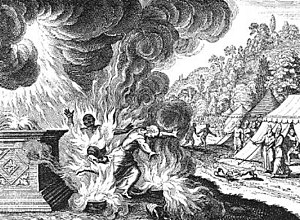 Image via Wikipedia
Image via WikipediaLeviticus 10: 3 states:
"Among those who approach Me, I will show Myself Holy; In the sight of the people I will be honored."
God took the sons of Jacob and claimed them as His own possession. However, the absolutely holy God, Jehovah, has to show the nation of Israel how to relate to Him. Something about what they did was done in violation of God's commands. By disobeying God, these two sons of Aaron dishonored God before Israel. Since God had just ordained Aaron and his sons to serve as priests for the nation, the irreverence of Nadab and Abihu was a pivotal point. Everyone had to understand that God provided only one correct way to approach him, i.e. that God recognizes only the way that He provided as the only correct way to approach Him.
Levites were given the sacred responsibility to teach, in Hebrew יָרָה (yara), the Israelites the decrees of the Lord as well as to distinguish between the clean and the unclean. Of note here is that yara is the root word for the Hebrew torah (תּוֹרָה) or law, which makes the words almost synonymous. The Law functioned as a moral "target" for the sons of Jacob. It was behaviour and attitude toward which they could shoot or aim.
One of the definitions of yara, יָרָה , is to shoot straight or to shoot like an arrow which carries with it the idea of aiming at a target while the definition of sin, in Hebrew חָטָא (chata'), is to miss the mark. With the Law, Israel learned what the target was, what God's expectations were, and they learned that they missed the mark, or sinned. The Law taught Israel that they were, by nature, a sinful people incapable of keeping God's Law.
Since God cannot tolerate sin and since man cannot keep the law, God provided the sacrificial system of atonement through which Israel could approach Him. The Levitical system provided for Israel to receive mercy and forgiveness for sin on the basis of blood atonement. On Yom Kippur, the High Priest entered the Holy of Holies carrying blood, from the sacrificed animal, with which he covered the mercy seat, hence atonement or covering. When God looked down from Heaven into the Ark of the Covenant, He saw the blood covering and forgave Israel. There was nothing Israel could do to earn forgiveness or to establish righteousness, it was entirely possible only through God's mercy, if done according to God's procedure.
Nadab and Abihu publicly dishonored God. Had God allowed them to live, He would have given Israel the erroneous message that all ways of worship are acceptable to Him.
Blue Letter Bible. "Dictionary and Word Search for yarah (Strong's 3384)". Blue Letter Bible. 1996-2010. 29 Aug 2010. < http:// www.blueletterbible.org/lang/lexicon/lexicon.cfm?
Strongs=H3384&t=KJV >
Blue Letter Bible. "Dictionary and Word Search for towrah (Strong's 8451)". Blue Letter Bible. 1996-2010. 29 Aug 2010. < http:// www.blueletterbible.org/lang/lexicon/lexicon.cfm?
Strongs=H8451&t=KJV >
No comments:
Post a Comment